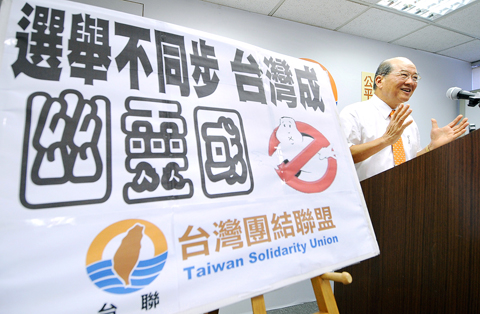Former Chinese Nationalist Party (KMT) legislator Chang Sho-wen’s (張碩文) father yesterday canceled his KMT party membership to run in the Yunlin County legislative by-election as an independent.
The move came after the KMT failed to dissuade him from running.
Yunlin Irrigation Association director Chang Hui-yuan (張輝元) said in a written statement that he would run in the by-election as an independent candidate.

PHOTO: LIAO CHEN-HUEI, TAIPEI TIMES
His daughter, Chang Yu-hsiuan (張鈺萱) yesterday completed the withdrawal process on his behalf at the KMT’s Yunlin branch.
In his written statement, Chang Hui-yuan said his decision to leave the party would give the KMT more freedom to finalize its candidate.
“Leaving the KMT is actually a big show of support for the party ... and I believe local supporters’ wisdom will be the final judge on such an unfair judicial system,” he said.
Chang Sho-wen, who won a legislative election in Yunlin County in January last year, lost his seat earlier this month after the High Court found him guilty of participating in a vote-buying scheme organized by his father.
Chang Hui-yuan, who was found guilty of vote buying in the first trial, registered with the KMT to run in the by-election on behalf of his son earlier this month.
The KMT later rejected his registration based on the revised version of its “black-gold exclusion clause,” which states that members who are found guilty of corruption at their first trial are not to be nominated for any election.
KMT Secretary-General Wu Den-yih (吳敦義) talked to Chang Hui-yuan and Chang Sho-wen on Wednesday night, but failed to dissuade Chang Hui-yuan from running.
KMT spokesman Lee Chien-jung (李建榮) yesterday expressed regret over Chang Hui-yuan’s move, but did not say whether the party would skip the primary to nominate the only registered hopeful for the by-election, Wu Wei-chi (吳威志), an associate professor at Yunlin Technology University.
The by-election will be held on Sept. 26.
In related news, the Taiwan Solidarity Union (TSU) said yesterday that the Executive Yuan should consider holding local and legislative elections at the same time to avoid the phenomenon of “phantom voters” following the approval of upgrades and mergers involving two cities and four counties.
The legal code states that a person is eligible to vote in a certain district after being a registered resident in the area for four full months.
TSU Chairman Huang Kun-huei (黃昆輝) said after the upgrades and the mergers have been completed, elections for the local government seats and legislative seats would be held one year apart, which means people could take advantage of the legal loophole to vote in two different districts by simply switching their household registration within the required time.
“In the future, population distribution could vary depending on the election season. Taiwan will become a country of phantom voters,” he said.
Huang said that a responsible government should ensure the fairness and impartiality of its elections and demanded that the Executive Yuan look into the matter.
The problem of “phantom voters” has occurred before, especially in districts where election races are tight. Some candidates mobilize non-residents to build temporary nests in a voting district in an effort to garner more votes, Huang said, giving the example of Keelung, which in 2005 reported negative population growth, but somehow returned to positive growth last month.

Taiwan has received more than US$70 million in royalties as of the end of last year from developing the F-16V jet as countries worldwide purchase or upgrade to this popular model, government and military officials said on Saturday. Taiwan funded the development of the F-16V jet and ended up the sole investor as other countries withdrew from the program. Now the F-16V is increasingly popular and countries must pay Taiwan a percentage in royalties when they purchase new F-16V aircraft or upgrade older F-16 models. The next five years are expected to be the peak for these royalties, with Taiwan potentially earning

STAY IN YOUR LANE: As the US and Israel attack Iran, the ministry has warned China not to overstep by including Taiwanese citizens in its evacuation orders The Ministry of Foreign Affairs (MOFA) yesterday rebuked a statement by China’s embassy in Israel that it would evacuate Taiwanese holders of Chinese travel documents from Israel amid the latter’s escalating conflict with Iran. Tensions have risen across the Middle East in the wake of US and Israeli airstrikes on Iran beginning Saturday. China subsequently issued an evacuation notice for its citizens. In a news release, the Chinese embassy in Israel said holders of “Taiwan compatriot permits (台胞證)” issued to Taiwanese nationals by Chinese authorities for travel to China — could register for evacuation to Egypt. In Taipei, the ministry yesterday said Taiwan

Taiwan is awaiting official notification from the US regarding the status of the Agreement on Reciprocal Trade (ART) after the US Supreme Court ruled US President Donald Trump's global tariffs unconstitutional. Speaking to reporters before a legislative hearing today, Premier Cho Jung-tai (卓榮泰) said that Taiwan's negotiation team remains focused on ensuring that the bilateral trade deal remains intact despite the legal challenge to Trump's tariff policy. "The US has pledged to notify its trade partners once the subsequent administrative and legal processes are finalized, and that certainly includes Taiwan," Cho said when asked about opposition parties’ doubts that the ART was

If China chose to invade Taiwan tomorrow, it would only have to sever three undersea fiber-optic cable clusters to cause a data blackout, Jason Hsu (許毓仁), a senior fellow at the Hudson Institute and former Chinese Nationalist Party (KMT) legislator, told a US security panel yesterday. In a Taiwan contingency, cable disruption would be one of the earliest preinvasion actions and the signal that escalation had begun, he said, adding that Taiwan’s current cable repair capabilities are insufficient. The US-China Economic and Security Review Commission (USCC) yesterday held a hearing on US-China Competition Under the Sea, with Hsu speaking on